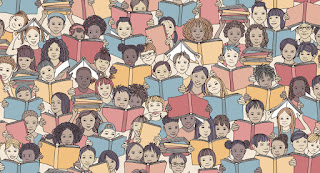After reading through the Trump executive orders earlier this week, I thought this article was a great example of why DEI is important and vital to schools. There was so much research mentioned in this article about how curriculum (specifically surrounding race and how people of that race are portrayed and discussed) affects kids in schools and colleges. We can't say enough that REPRESENTATION MATTERS, but also how are those people represented? Sleeter argues throughout this entire article that the lack of appropriate representation and the dominance of Euro-American perspectives discourages engagement with students of color and that ethnic studies is a way for them to re-engage with education.
1. "Systematic analyses, however, consistently find the opposite. While content related to African Americans, Latinos, and Native Americans has been added, deeper patterns and narratives that reflect Euro-American experiences and worldviews, and that have traditionally structured K–12 textbooks—particularly history and social studies texts—remain intact". Even with all the progress in our country with all of these diversity, equality, and inclusion initiatives we have still missed out on so much in the realm of educational curriculum. How is a student of color going to feel engaged, but also involved in a history course if the only time they see themselves in it is during discussions of racial violence, slavery, aad black history month? It feels as though these narratives were sprinkled in to meet a quota and the actual work of "what does it mean to live in history and our current age as a _____ person?" has not been done. It reminds me of the article we read by Delpitt and their view of the Silenced Dialogue.
2. "Like the eighth graders interviewed by Epstein, 43 gifted Black middle school students interviewed by Ford and Harris (2000) all expressed a desire to learn more about Black people in school; most agreed that this would make school more interesting, and almost half agreed that they got tired of learning about White people all the time." I remember being so excited in school anytime we would talk about a female person in history. It felt important, like seeing something that I could do just because someone else of my gender had done it. This is a small example in light of the topic of race and having appropriate representation, but the feeling is there. It is vital to student to see themselves in history and books, not only in situations that are compromising and hostile but there are too many good examples of people of color in our world who could be better represented/talked about in these school books. Can you imagine the change in student engagement?? It's hard to never be the one represented, especially not in a positive or uplifting light.
3. "Lewis (2001) found several White parents she interviewed to believe that talking about race would be divisive, even in the context of Black History Month, and to dismiss ethnic diversity with statements such as 'We should all be Americans.' " The colorblindness theory is very much at work in these findings. "It's too hard or painful or divisive to talk about race (we would have to own our privilege and power) so let's just forget it and all be American". This feels very much like the sentiment of the executive orders regarding DEI. It's as though these white people just want to "move on" and forget that race exists. In the meantime, however, our systems that support diversity and inclusion have just been directly attacked and it is disturbing to see our executive office take this stance, and sadly leadership does dictate a lot of where our country will go.





Bre, I can relate with you ton topic 2 needing to feel connected and being excited when I could connect with someone from history and how it made me excited. As an Armenian I know I always felt represented when curriculums said they would acknowledge the genocide.
ReplyDelete